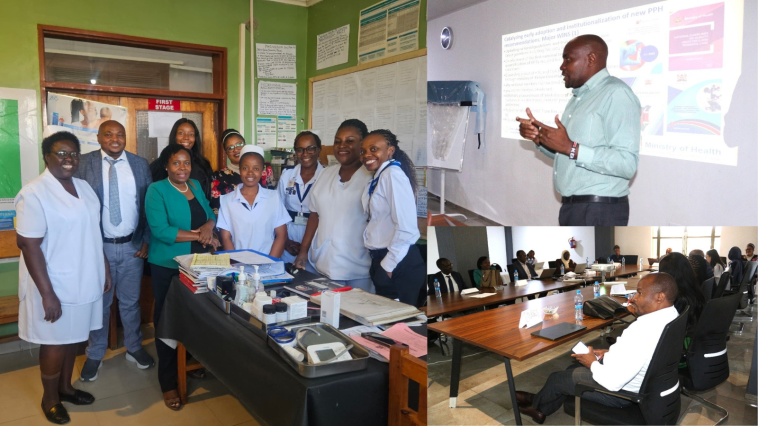Zambia hosts regional workshop to accelerate progress in postpartum haemorrhage care

From 9 to 12 June 2025, medical and policy leaders from across Africa convened in Zambia for a high-level workshop aimed at strengthening the implementation of the Accelerating Measurable Progress and Leveraging Investments for Postpartum Haemorrhage Impact (AMPLI-PPHI) project, a collaborative initiative to reduce maternal mortality caused by postpartum haemorrhage (PPH).
Representatives from national OBGYN associations in Zambia, Kenya, Nigeria, Uganda and Tanzania joined FIGO project coordinators to share experiences, assess progress and strategise for the future of maternal healthcare in the region.
Regional knowledge-sharing drives progress
The four-day face-to-face workshop highlighted cross-country learnings on the implementation of the E-MOTIVE care bundle, a set of clinical tools that includes heat-stable carbetocin (HSC), tranexamic acid (TXA) and calibrated drapes, aimed at improving PPH detection and response.
Country teams presented some encouraging feedback on the use of these critical PPH commodities and discussed implementation challenges, drawing from experiences to find solutions. Discussions emphasised the importance of adopting an inclusive and collaborative approach that engages pharmacists, nurses, midwives and clinical officers in decision-making processes. They also highlighted the need to involve businesses and manufacturers, as well as to increase efforts to reduce the cost of vital tools such as calibrated drapes.
Advocacy and financing conversations
On the third day of the workshop, participants shifted their attention to advocacy and sustainability, stressing that government commitment to policy change is vital to ensuring access to life-saving clinical supplies.
Participants acknowledged that building strong relationships with ministries of health is vital to keep momentum towards national adoption of the E-MOTIVE bundle approach. Country teams also discussed ongoing funding challenges and the impact of recent cuts to global aid, sharing ideas on how best to engage with potential funders and seek financial support.
Site visits reinforce ground-level realities
Workshop participants visited several health facilities, including Chilenje Level One Hospital, Bauleni Clinic, Kafue General Hospital and Nangongwe Urban Clinic in Kafue district. These visits revealed both the successes and the operational challenges in implementation. Meaningful conversations were held with key stakeholders, including midwifes, which provided valuable insights into the impact and progress of the AMPLI-PPHI project.
The meeting was very well organised and very informative. The countries are at different levels but all of them are doing a great job. The enthusiasm for PPH control is very palpable. All countries are very committed to the program and are looking forward to realising the outcomes. The sites we visited are also very committed and have welcomed the project. The impact of HSC is already being seen in just one month of use.
– Ugandan team representative
Looking ahead: continued investment, advocacy and collaboration are crucial to success
The workshop concluded with a clear consensus: while significant progress has been made, continued investment, advocacy and collaboration are crucial to sustaining and scaling up successful health interventions. Participants from all country teams reaffirmed their commitment to eradicate preventable maternal deaths through practical solutions, shared knowledge and collective leadership.
The challenges to end maternal deaths from PPH can be overcome. What we are witnessing is a global movement gaining momentum – one grounded in science, driven by regional solidarity and fuelled by an unwavering commitment to save mothers’ lives.
Find out more about the AMPLI-PPH project exchange hubs.